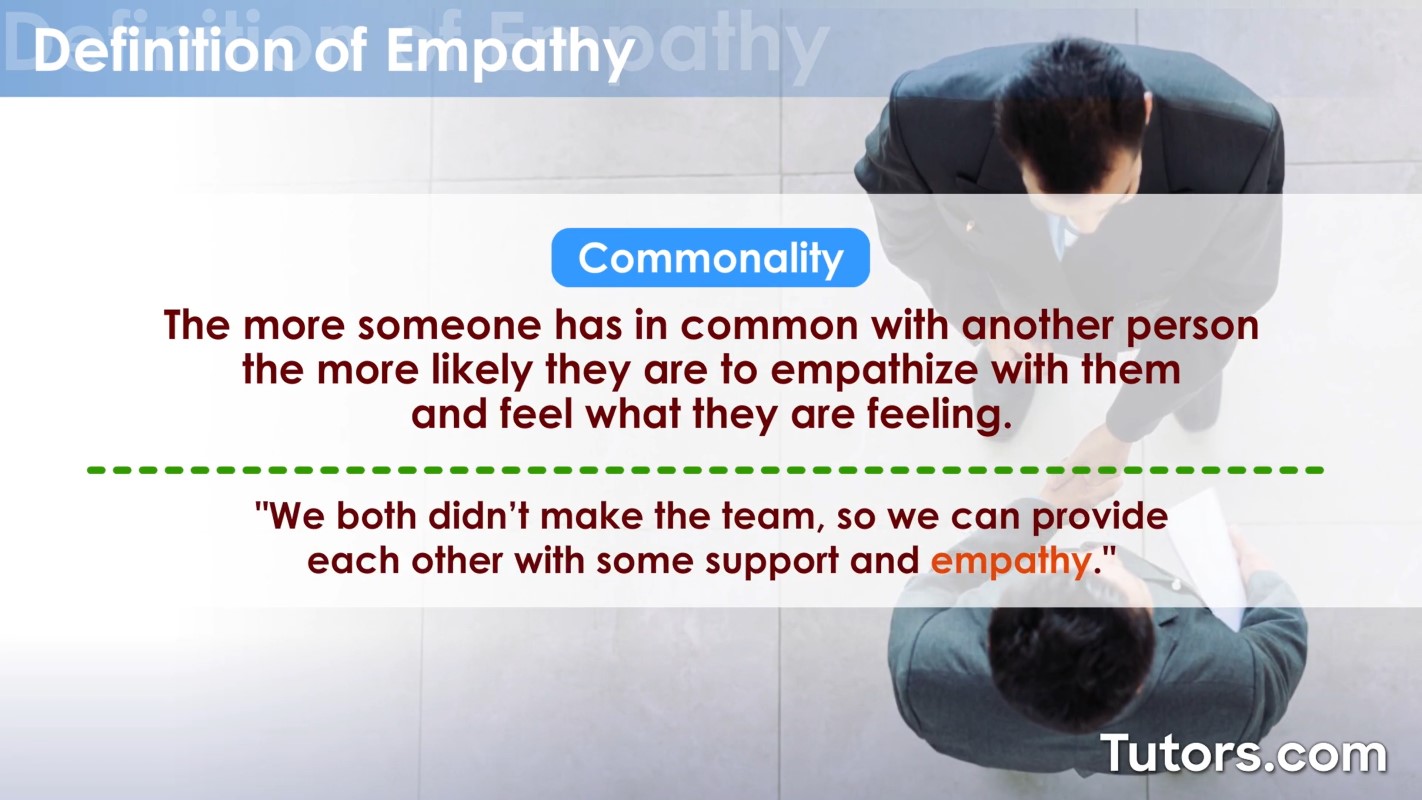Empathy vs. Sympathy — Definitions and Examples
Difference between sympathy and empathy
Sympathy is feeling compassion or pity for someone, whereas empathy means experiencing someone else’s feelings.
Sympathy and empathy are often used interchangeably, but the terms are not synonymous. Both are nouns involving emotions and feelings toward a person or thing, but the type of emotional connection they suggest differs.
Sympathy primarily means feeling sorry for someone else’s misfortune or suffering.
Empathy is the ability to understand and feel the emotions of another person.

Definition of sympathy
Sympathy consists of the prefix “sym-,” meaning “together” or “with,” and the base word “pathos,” which roughly means “feelings.” In its simplest form, sympathy means “with feeling.”
Overall, sympathy has two primary uses, both of which deal with being “in sync:”
Use 1: Feeling pity or sorrow toward someone else’s situation
Use 2: Show support, understand, or agree with

Sympathy can also function as an adjective (sympathetic) and a verb (sympathize).
Being sympathetic means feeling or showing sympathy.
To sympathize means to experience sympathy.
Definition of empathy
Empathy concerns sharing the feelings of another person to understand their suffering. It is the ability to experience another person’s emotions realistically or imaginatively. Having gone through a similar situation as the person does create empathy; however, it is not necessary to have shared the exact same experience.

Empathy is an individual’s ability to walk in another person’s shoes and feel what they are feeling. This ability typically occurs by direct similarity or commonality.
Direct similarity occurs when a person directly relates to someone’s personal experience and remember how they felt at the time.
Commonality, in this case, means the more someone has in common with another person, the more likely they are to empathize with them and feel what they are feeling.

Empathy can also function as an adjective (empathetic) and a verb (empathize).
Being empathetic (adjective) means feeling or showing empathy.
To empathize (verb) means to experience empathy.
Empathy vs. sympathy examples
The following sentences include examples of empathy and sympathy as nouns, adjectives, and verbs:
Sympathy (Noun)
My deepest sympathy goes out to you and your family.
A wave of sympathy washed over the country.
The doctor shows sympathy toward all his patients.
Sympathetic (Adjective)
He was hoping his boss would be more sympathetic to his reason for being late.
I’d be more sympathetic if he weren’t so selfish.
The company is sympathetic to its employees who cannot afford daycare.
Sympathize (Verb)
I sympathize with your condition and will do whatever I can to help.
The film suggests that most Americans sympathize with injured veterans.
Many people sympathize with animals in zoos.
Empathy (Noun)
Because she immigrated years ago, she has empathy for those trying to move to the country.
Spending the summer at my dad’s job helped me gain empathy for what he does.
She had great empathy for the animals after working at the reserve.
Empathetic (Adjective)
Successful authors create empathetic characters who connect directly to their audience.
Empathetic therapists often use their own experiences to help their patients.
He couldn’t be empathetic because he never experienced the same challenges.
Empathize (Verb)
It was hard for her to empathize because she had never been through something like that.
Growing up in an impoverished family allowed her to empathize with her clients at the unemployment office.
I should trust that my parents can empathize with what I’m going through because they were once teenagers too.